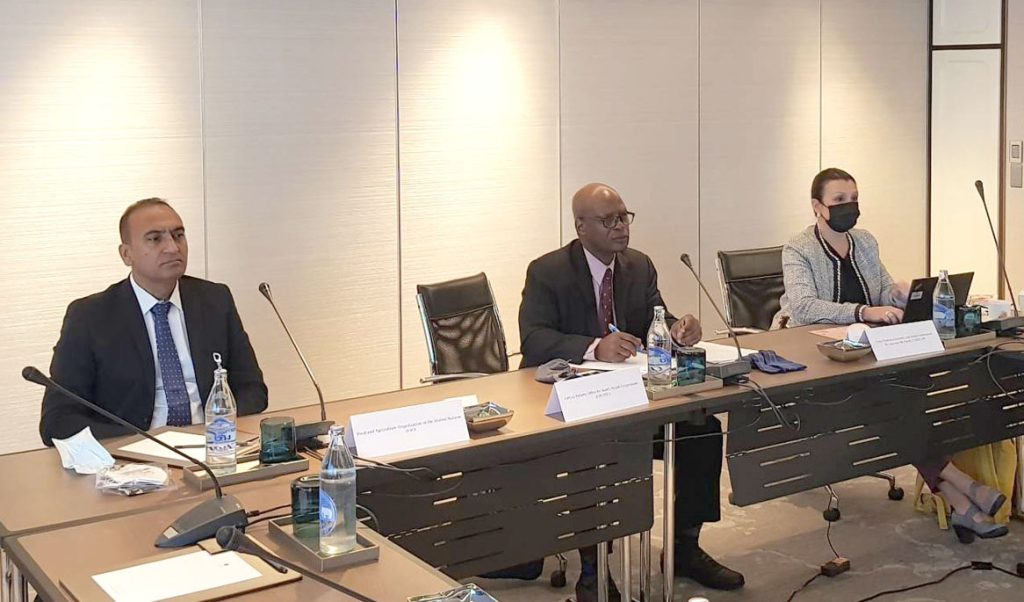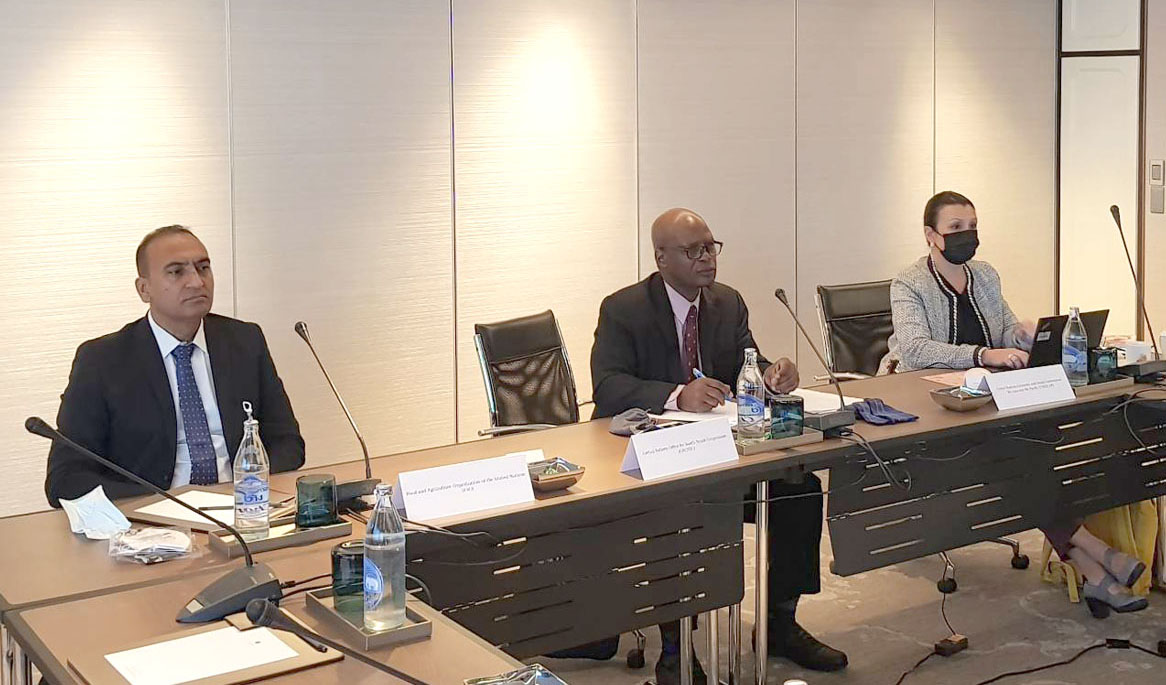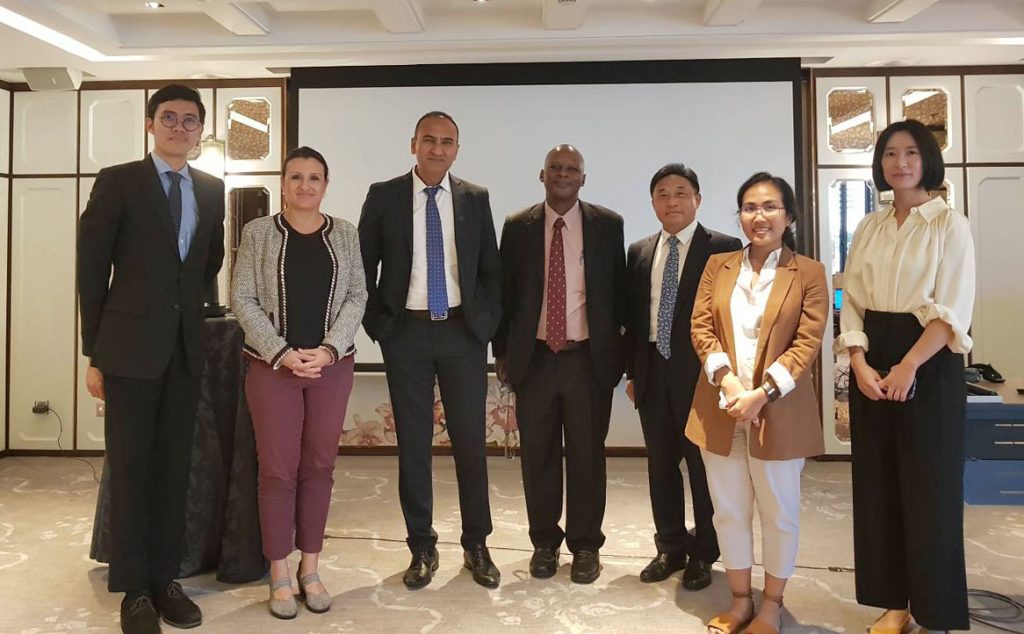Mr. Dominic Asante Opoku-Manu, Policy Analyst at SDGs Advisory Unit, Office of the President of Ghana, represented COMSATS at UNOSSC Retreat “Feasibility of Compiling Asia-Pacific Regional Report on South-South Cooperation 2021”
Being an active partner of UNOSSC and flagbearer of South-South Cooperation, COMSATS was invited by UNOSSC for participation in UN Regional South-South and Triangular Cooperation Focal Points Network Retreat in Asia and the Pacific to discuss “Feasibility of Compiling Asia Pacific Regional Report on South-South Cooperation 2021”, held on 15th December 2021. Around 30 experts from UN system and intergovernmental institutions joined the meeting (online and physical both) that deliberated on the contents and respective roles of organisations in compiling the Report.
Mr. Dominic Asante Opoku-Manu, Policy Analyst at SDGs Advisory Unit, Office of the Presi dent of Ghana, represented COMSATS at the retreat upon nomination of the Executive Director COMSATS. Apart from COMSATS, other participating institutions included: Centre on Integrated Rural Development for Asia and the Pacific (CIRDAP), Food and Agriculture Organization (FAO), International Labour Organization (ILO), International Science, Technology and Innovation Centre for South-South Cooperation under the Auspices of UNESCO (ISTIC), Partners in Population and Development (PPD), UN Capital Development Fund (UNCDF), United Nations Development Programme (UNDP), United Nations Environment Programme (UNEP), United Nations Economic and Social Commission for Asia and the Pacific (UNESCAP), United Nations Educational, Scientific and Cultural Organization (UNESCO), United Nations Industrial Development Organization (UNIDO), United Nations Volunteers (UNV) and World Food Programme (WFP).
dent of Ghana, represented COMSATS at the retreat upon nomination of the Executive Director COMSATS. Apart from COMSATS, other participating institutions included: Centre on Integrated Rural Development for Asia and the Pacific (CIRDAP), Food and Agriculture Organization (FAO), International Labour Organization (ILO), International Science, Technology and Innovation Centre for South-South Cooperation under the Auspices of UNESCO (ISTIC), Partners in Population and Development (PPD), UN Capital Development Fund (UNCDF), United Nations Development Programme (UNDP), United Nations Environment Programme (UNEP), United Nations Economic and Social Commission for Asia and the Pacific (UNESCAP), United Nations Educational, Scientific and Cultural Organization (UNESCO), United Nations Industrial Development Organization (UNIDO), United Nations Volunteers (UNV) and World Food Programme (WFP).
Opening the session, Mr. Denis Nkala, UNOSSC Regional Coordinator for Asia-Pacific region, introduced to the participants the purpose of the Retreat, which he communicated is to exchange knowledge and seek cooperation on effective integration of South-South cooperation to help respond to developmental challenges in the region. He also sketched historical timeline of South-South and Triangular cooperation and the relevancy of this tool with global response to the Pandemic in current times. He further delineated how South-South cooperation can be deployed at regional and country level under the UN reforms. Mr. Christophe Bahuet, UNDP Deputy Regional Director for Asia and the Pacific and Director of Bangkok Regional Hub, underlined three premises of the South-South Cooperation in the region: centrality of cooperation to the national development of countries in Asia-Pacific region; provision of development cooperation assistance by this region in a very structured and institutional way; and primacy of South-South cooperation in the work of United Nations Development System that is reflected in the Common Countries Analysis (CCA) and in the UN Sustainable Development Cooperation Frameworks (SDCF).
Professor Shahbaz Khan, Director of the UNESCO Office, pointed out that in the backdrop of pressing planetary and socio-economic challenges, sustainable and innovative digitalization solutions can deliver positively on SDGs in a high-quality, relevant and efficient manner.
Discussions during the sessions touched upon vital topics such as the role of South-South and triangular cooperation in digital transformation of the South and in COVID-19 response. Each session was followed by discussions and the participants availed the opportunity to share their initiatives and challenges.
It was agreed during the Retreat that UNOSSC will facilitate groups of interested stakeholders to promote action under specific themes and sectors such as the digital transformation, post COVID-19 recovery and entrepreneurship. Key recommendations made during the Retreat included:
- South-South cooperation has its features and principles necessitating different approaches to carry out South-South cooperation. The solidarity and empathy shown by countries during COVID-19 pandemic confirms this. South-South Cooperation does not require large amounts of resources to achieve an impact.
- South-South and Triangular cooperation needs to be fully embedded and well-structured in the UN reforms at regional and country level. This can be done through its integration in CCA and UNSDCF. Furthermore, the UN system can play an important role in strengthening the inputs of emerging development partners by proposing international standards.
- Demands from recipient countries need to be attentively addressed for South-South and Triangular cooperation so as to better support them in addressing their challenges.
- South-South cooperation can help to link up what may seem to be separate issues by its focus on disadvantaged communities.
Pertaining to actions in follow-up to the retreat, UNOSSC will facilitate groups of interested stakeholders to promote action under specific themes and sectors such as the digital transformation, post COVID-19 recovery and entrepreneurship. The participants of the retreat welcomed convening of the pending South-South Global Development. They also deliberated on the opportune time to scale up South-South cooperation and looked forward to providing inputs to the High-Level Committee (HLC) on South-South cooperation and the South Summit to be convened in 2021.







